"How Israel Became A Fascist State" with Ilan Pappé
Plus a review of "Examining ‘Ten Myths about Israel’, by Ilan Pappé written by Allan C Brownfeld
Dear subscribers, please note that this post exceeds the limit for email. As such, please click on the title to read it in full on Substack.
The following is one of the best and most informative interviews with Ilan Pappé which I have listened to since October 2023.
If you are not familiar with Ilan Pappé, this is an overview of his background as published by Good Reads:
Ilan Pappé is a professor with the College of Social Sciences and International Studies at the University of Exeter in the UK, director of the university's European Centre for Palestine Studies, co-director of the Exeter Centre for Ethno-Political Studies, and political activist. He was formerly a senior lecturer in political science at the University of Haifa (1984–2007) and chair of the Emil Touma Institute for Palestinian and Israeli Studies in Haifa (2000–2008).
Pappé is one of Israel's "New Historians" who, since the release of pertinent British and Israeli government documents in the early 1980s, have been rewriting the history of Israel's creation in 1948, and the corresponding expulsion or flight of 700,000 Palestinians in the same year. He has written that the expulsions were not decided on an ad hoc basis, as other historians have argued, but constituted the ethnic cleansing of Palestine, in accordance with Plan Dalet [link added] drawn up in 1947 by Israel's future leaders. He blames the creation of Israel for the lack of peace in the Middle East, arguing that Zionism is more dangerous than Islamic militancy, and has called for an international boycott of Israeli academics.
His work has been both supported and criticized by other historians. Before he left Israel in 2008, he had been condemned in the Knesset, Israel's parliament; a minister of education had called for him to be sacked; his photograph had appeared in a newspaper at the centre of a target; and he had received several death threats.
This is the description for the interview linked below with Ilan Pappé:
On the 7th April 2025 at EartH in Hackney, Aaron Bastani was joined by legendary historian Ilan Pappé for a special live version of Downstream.
They discussed the origins of Britain's Israel lobby, the indoctrination of Israelis and whether the recent atrocities committed in Gaza and the West Bank are signs of Israel's imminent collapse.
The following is the reposting of a good review of Ilan Pappé’s 2017 book, Examining Ten Myths about Israel as published on the Mondoweiss website.
Examining ‘Ten Myths about Israel’, by Ilan Pappé
By Allan C. Brownfeld January 24, 2018 • Mondoweiss
Ilan Pappe
This review of the book “Ten Myths About Israel’ by Ilan Pappe will appear in the Winter 2018 ISSUES, the quarterly journal of the American Council for Judaism. The book is published by Verso.
The Middle East remains a subject of increasing examination and debate. The prospects for peace between Israelis and Palestinians seem to be receding. Early in 2018, Israel’s ruling Likud Party unanimously endorsed a resolution calling for the annexation of West Bank settlements. This decision marked the latest step by Likud to distance itself from the internationally backed idea of establishing an independent Palestinian state as part of a future peace agreement. Public Security Minister Gilad Erdan declared: “We are telling the world that it doesn’t matter what the nations of the world say. The time has come to express our biblical right to the land.”
Much of the world’s understanding of the conflicting claims to historic Palestine is confused. We have heard over the years of “an Israeli narrative” and a “Palestinian narrative.” There have been too few efforts to understand what really has happened in this region, and to arrive at some agreement about where myth ends and facts begin. In this book, written on the 50th anniversary of Israel’s occupation of the West Bank and East Jerusalem, Professor Ilan Pappe, an Israeli historian now teaching at the University of Exeter in the United Kingdom, examines the most contested ideas concerning the origins and identity of the contemporary state of Israel.
The “ten myths” that Pappe explores reinforce the regional status quo. He explores the claim that Palestine was an empty land at the time of the Balfour Declaration, as well as the formation of Zionism and its role in the early decades of nation building. He asks whether the Palestinians voluntarily left their homeland in 1948, and whether June 1967 was a war of “no choice.” Turning to the myths surrounding the failures of the Camp David Accords and the official reasons for the attacks on Gaza, he explains why the two state solution, in his view, is no longer viable.
Historical Disinformation
“As the example of the Israel-Palestine conflict shows,” writes Pappe, “historical disinformation, even of the most recent past, can do tremendous harm. This willful misunderstanding of history can promote oppression and protect a regime of colonization and occupation. It is not surprising, therefore, that policies of disinformation continue to the present and play an important part in perpetuating the conflict…The Zionist historical account of how the disputed land became the state of Israel is based on a cluster of myths that subtly cast doubt on the Palestinians’ moral right to the land…This book challenges these myths, which appear in the public domain as indisputable truths. These statements are, to my eyes, distortions and fabrications that can—and must—be refuted through a closer examination of the historical record.”
The author begins by admitting that, “This is not a balanced book; it is yet another attempt to redress the balance of power on behalf of the colonized, occupied and oppressed Palestinians in the land of Israel and Palestine. It would be a real bonus if advocates of Zionism or loyal supporters of Israel were also willing to engage with the arguments herein. After all, the book is written by an Israeli Jew who cares about his own society as much as he does the Palestinian one. Refuting mythologies that sustain injustice should be of benefit to everyone living in the country or wishing to live there. It forms a basis on which all its inhabitants might enjoy the great achievements that only one privileged group currently has access to.”
The first myth which is confronted is the Zionist claim that Palestine was an empty land. There is a consensus among scholars that it was the Romans who gave the land the name “Palestine.” During the period of Roman and, later, Byzantine, rule it was an imperial province. Various Muslim empires aspired to control it, since it was home to the second holiest place in Islam and was also fertile and in a strategic location. The Ottoman period began in 1517 and lasted 400 years. When the Ottomans arrived, they found a society that was mostly Sunni Muslim and rural, with small urban elites who spoke Arabic. Less than 5 per cent of the population was Jewish and probably 10 to 15 per cent Christian.
Jewish Population of 2 to 5 Per Cent
Historian Yonatan Mendel notes that, “The exact percentage of Jews prior to the rise of Zionism is unknown. However, it probably ranged from 2 to 5 per cent. According to Ottoman records, a total population of 462,465 resided in 1878 in what is today Israel/Palestine. Of this number, 403,795 (87 per cent) were Muslim, 43,659 (10 per cent) were Christian and 15,011 (3 per cent) were Jewish.”
Those who receive their information from official Israeli sources, Pappe shows, would come away with the view that, “Sixteenth-century Palestine… was mainly Jewish and the commercial lifeblood of the region was concentrated in the Jewish communities.” According to the Website of the Israeli Foreign Ministry, Pappe points out, “By 1800, Palestine had become a desert…Every passing year the land became more barren, deforestation increased and farmland turned to desert. Promoted through an official state website this fabricated picture is unprecedented.”
Many Israeli scholars have challenged this false narrative, among them David Grossman (the demographer not the novelist), Amnon Cohen and Yehoushua Ben-Arieh. Their research shows that, over the centuries, Palestine, rather than being a desert, was a thriving Arab society. Yet, Pappe reports, “Outside of Israel, in particular in the United States, the assumption that the promised land was empty, desolate, and barren before the arrival of Zionism is still alive and kicking…Palestine began to develop as a nation long before the arrival of the Zionist movement. In the hands of energetic local rulers such as Daher al-Umar (1690-1775), the towns of Haifa, Shefamr, Tiberias, and Acre were renovated and re-energized. The coastal network of ports and towns boomed through its trade connections with Europe, while the inner plains traded inland with nearby regions. The very opposite of a desert.”
Sizeable Population
At the end of the 19th century, Palestine had a sizeable population, of which only a small percentage was Jewish. Those Jews who did live in Palestine at this time were opposed to the ideas promoted by Zionism. Contrary to the notion of Palestine being an “empty land,” Pappe shows that, “It was part of a rich and fertile eastern Mediterranean world that in the 19th century underwent processes of modernization and nationalization. It was not a desert waiting to come into bloom; it was a pastoral country on the verge of entering the 20th century as a modern society, with all the benefits and ills of such a transformation. Its colonization by the Zionist movement turned this process into a disaster for the majority of the native people living there.”
The second myth considered is that, “The Jews Were a People Without a Land.” Asking whether the Jewish settlers who arrived in Palestine could be considered “a people,” Pappe cites Shlomo Sand’s “The Invention of the Jewish People,” which shows that the Christian world, in its own interest, adopted the idea of the Jews as a nation that must one day return to the holy land. This return, in their view, would be part of the divine scheme for the end of the world, along with the resurrection of the dead and the second coming of the Messiah.
The theological upheavals of the Reformation beginning in the 16th century produced a clear association, particularly among Protestants, between the idea of the end of the millennium and the conversion of the Jews and their return to Palestine. Thomas Brightman, a 16th century English clergyman, wrote, “Shall they return to Jerusalem again? There is nothing more certain: the prophets do everywhere confirm it and beat about it.” Brightman wished the Jews either to convert to Christianity or leave Europe. A hundred years later, Henry Oldenburg, a German theologian, wrote: “If the occasion presents itself amid changes to which human affairs are liable, the Jews may even raise their empire anew, and…God may elect them a second time.”
A Christian Project of Colonization
“Zionism,” writes Pappe, “was therefore a Christian project of colonization before it became a Jewish one… A powerful theological and imperial movement emerged that would put the return of the Jews to Palestine at the heart of a strategic plan to take over Palestine and turn it into a Christian entity… This dangerous blend of religious fervor and and reformist zeal…would lead to the Balfour Declaration of 1917.”
An important advocate of a Jewish return to Palestine in England in the 19th century was Lord Shaftesbury (1801-85), a leading politician and reformer, who campaigned actively for a Jewish homeland in Palestine. His arguments for a greater British presence in Palestine were both religious and strategic. As Pappe reports, “Lord Shaftesbury convinced the Anglican bishopric center and cathedral in Jerusalem to provide the early funding for this project. This would probably not have happened at all had Shaftesbury not succeeded in recruiting his father in law, Britain’s foreign minister and later prime minister, Lord Palmerston, to the cause.”
In 1839, Shaftesbury wrote a 30-page article in The London Quarterly Review in which he predicted a new era for the Jews: “…the Jews must be encouraged to return in yet greater number and become once more the husbandman of Judea and Galilee…though admittedly a stiff-necked people and sunk in moral degradation, obduracy, and ignorance of the Gospel, (they are) not only worthy of salvation but also vital to Christianity’s hope and salvation.”
There has been much speculation, Pappe points out, about whether the Jews who settled in Palestine as Zionists were really the descendants of the Jews who had been exiled 2,000 years ago. Arthur Koestler (1905-83) wrote “The Thirteenth Tribe” (1976) in which he advanced the theory that the Jewish settlers were descended from the Khazars, a Turkish nation of the Caucasus which converted to Judaism in the 8th century and was later forced to move westward. Israeli scientists have ever since tried to prove that there is a genetic connection between the Jews of Roman Palestine and those of present-day Palestine. That debate continues today.
Israel’s Claim to Represent all Jews
“It is not the claims of 19th century Zionism, it is not the historical accuracy of those claims that matters,” argues Pappe. “What matters is not whether the present Jews in Israel are the authentic descendants of those who lived in the Roman era, but rather the state of Israel’s insistence that it represents all the Jews in the world and that everything it does is for their sake and on their behalf. Until 1967, this claim was very helpful for the state of Israel. Jews around the world, particularly in the United States, became its main supporters whenever its policies were questioned. In many respects, this is still the case in the U.S. today. However, even there, as well as in other Jewish communities, this clear association is nowadays challenged.”
In making the case that Jews were a nation belonging to Palestine, and therefore should be helped to return to it, Pappe notes, “They had to rely on British officials and, later, military power. Jews and the world at large did not seem to be convinced that the Jews were a people without a land. Shaftesbury, Finn, Balfour, and Lloyd George liked the idea because it helped Britain gain a foothold in Palestine. This became immaterial after the British took Palestine by force and then had to decide from a new starting point whether the land was Jewish or Palestinian—a question it could never properly answer, and therefore had to leave to others to resolve after 30 years of frustrating rule.”
Of particular interest is the chapter dealing with the myth that, “Zionism is Judaism.” In fact, Zionism was originally a minority opinion among Jews. “Since its inception in the mid-19th century,” writes Pappe, “Zionism was only one, inessential expression of Jewish cultural life. It was born out of two impulses among Jewish communities in Central and Eastern Europe. The first was a search for safety within a society that refused to integrate Jews as equals and that occasionally persecuted them… The second impulse was a wish to emulate other new national movements mushrooming in Europe at the time… Those Jews who sought to transform Judaism from a religion into a nation were not unique among the many ethnic and religious groups within the two crumbling empires—the Austro-Hungarian and the Ottoman—who wished to redefine themselves as nations.”
Redefinition of Judaism
The early Zionists put forward two new ideas: the redefinition of Judaism as a national movement and the need to colonize Palestine. These ideas became more popular after a brutal wave of pogroms in Russia in 1881, which transformed them into a political program propagated by a movement called “The Lovers of Zion,” who sent a few enthusiastic young Jews to build the first new colonies in Palestine in 1882. This first phase of Zionism culminated with the works and actions of Theodor Herzl, a journalist and an atheist with no connection to Jewish religious life. He came to the conclusion that widespread anti-Semitism made assimilation impossible and that a Jewish state in Palestine was the best solution for the “Jewish Problem.”
While such ideas gained some support in countries such as Russia, where Jews were second-class citizens, Pappe writes that, “As these early Zionist ideas were aired among Jewish communities in countries such as Germany and the United States, prominent rabbis and leading figures in those communities rejected the new approach. religious leaders dismissed Zionism as a form of secularization and modernization, while secular Jews feared that the new ideas would raise questions about the Jews’ loyalty to their own nation-states and would thus increase anti-Semitism.”
Related posts:

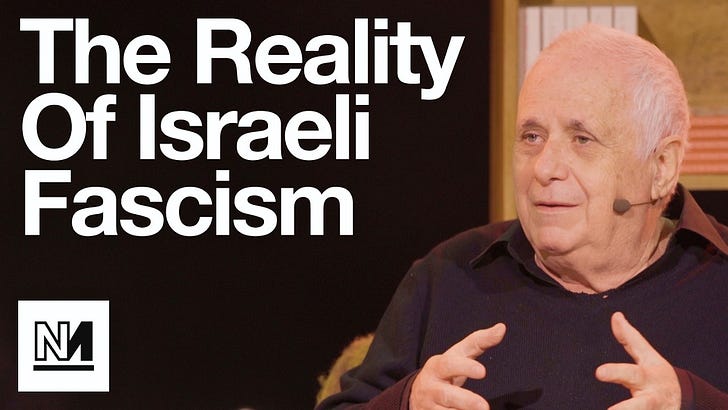


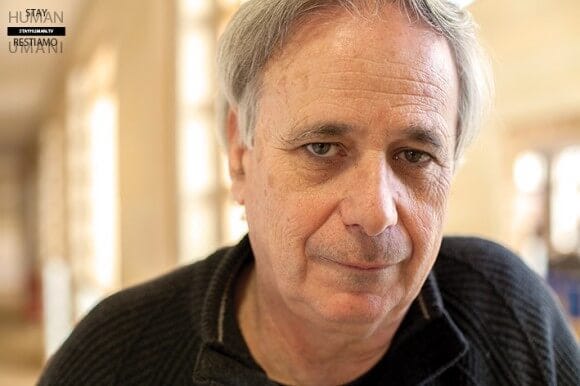
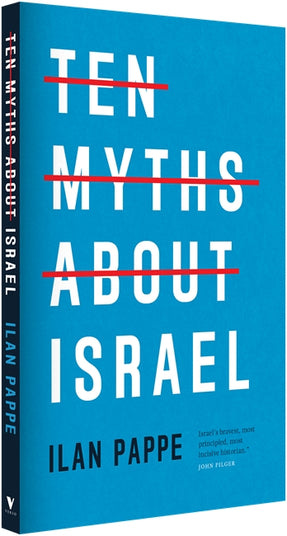


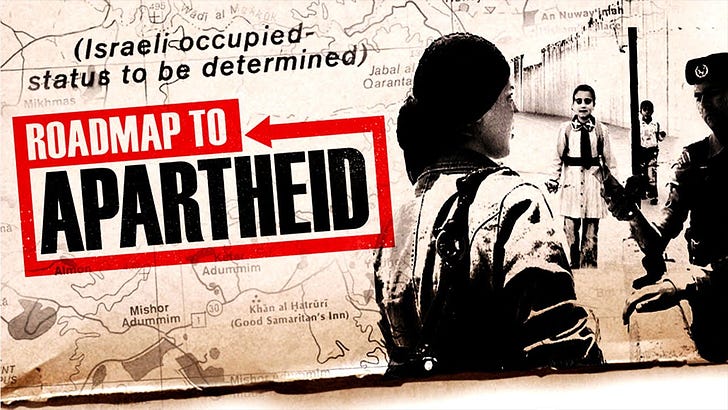


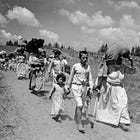

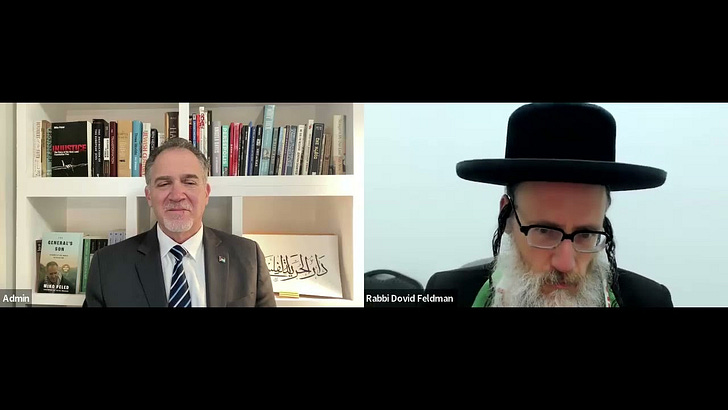

Thanks for this important post, Azra. The video was excellent and inspiring.
There is an important book: Adolf Hitler - Founder of Israel: Israel in War With Jews [Hennecke Kardel]
Also: Edwin Black - The Transfer Agreement and IBM; and the Holocaust.
And we must not forget Albert pile's prophecies.
My point is... Israel was always a fascist state... designed for self destruction.
Satanyahoo is the new Nero
Sacrificing Israel on the Altar of Globalism
https://fritzfreud.substack.com/p/sacrificing-israel-on-the-altar-of